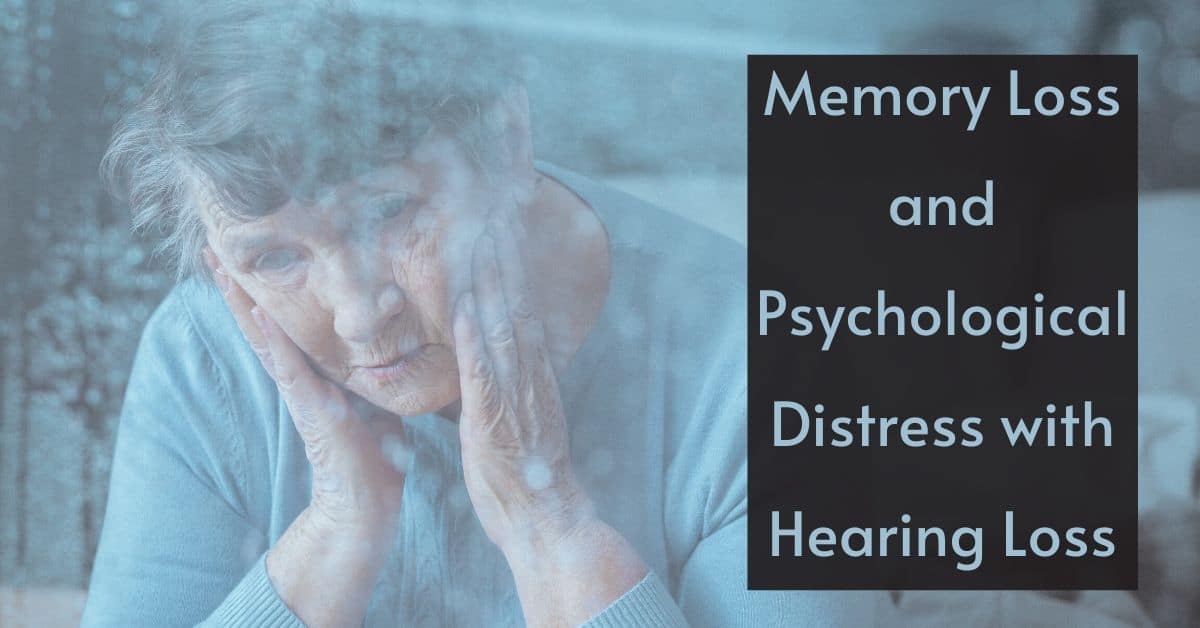
The risk of hearing loss rises as you age, affecting 1 in 3 people over the age of 65 and almost half of those over 75. Hearing loss is the fourth leading cause of long-term disability worldwide, affecting roughly 466 million people.
Although hearing loss itself is severe, the many side effects are, in many ways, the larger concern. Untreated hearing loss is related to several conditions associated with your physical and mental wellbeing. A recent study indicates that this could lead to loss of memory and psychological distress.
A study establishes a link between hearing loss and memory loss, psychological distress.
A 2019 study by Tsukuba University in Japan examined how hearing loss can affect older adults. The researchers reviewed national survey responses over the age of 65 from over 130,000 seniors. They found that there was a hearing loss in 9 percent of seniors.
The researchers looked at memory loss and psychological distress to see if differences existed between seniors with hearing loss and seniors with regular hearing.
The findings showed a strong connection between hearing loss and psychological distress. Researchers found that 39.7 percent of seniors with hearing loss reported psychological distress, while only 19.3 percent reported psychological distress among those without hearing loss.
Even more important were the numbers for memory loss. 37.7 percent of seniors with hearing loss reported having trouble remembering things. Of those without hearing loss, just 5.2 percent registered memory issues. That is a 7 to 1 ratio!
The study has suggested that living with untreated hearing loss has a significant impact on memory loss, and you are at a much higher risk of memory loss if you are struggling to hear.
A large-scale study
If you ask a few people questions about the relationship between hearing loss, memory loss, and psychological distress, you may find very different responses from one person to another. Only by asking a large group of people the same questions would you isolate the effect of hearing loss separate from the many other factors we know that can cause memory loss and psychological distress.
That was precisely what happened with the study mentioned above; it was based on data from a survey titled “Japan’s Comprehensive Survey of Living Conditions.” This survey questioned a large group of older adults aged 65 or older about several aspects of their lives — one of the questions they asked was about their hearing loss experience.
How hearing loss affects mental health and memory
The University of Tsukuba’s findings are not surprising. There’s a growing body of research pointing to the adverse effects of hearing loss on our minds and bodies as we age. Here are some of the most common ways our cognitive health and mental wellbeing can be undermined by hearing loss if it goes untreated.
- Increased stress: Untreated hearing loss in social settings causes anxiety. The frustration of not being able to participate equally in a conversation and the fear of making mistakes can cause individuals to isolate themselves from their friends and loved ones. The greater the hearing impairment a person has, the higher their chances are of suffering from stress and anxiety when engaging in conversation with others.
- Loneliness: Increased stress can make people shy away from social events, which can lead to increased loneliness and solitude. This may lead to cognitive changes when it is prolonged because the brain experiences fewer sound stimuli than it should do. Isolation has been found to lead to brain atrophy, thereby increasing the risk of Alzheimer’s disease and other forms of dementia developing.
- Anxiety and Depression: Research suggests that mental health issues, such as depression and anxiety, can result from loneliness and communication difficulties. Depression is associated with memory problems such as difficulty thinking and feeling lost. Long term depression can also make everyday life or decision making difficult.
Study authors recommend hearing aids.
The study authors were under no qualms about what should be done to help those seniors with memory issues and psychological stress:
“Hearing loss takes an enormous toll on older people in so many ways, physically and mentally, while limiting activities of daily living,” according to co-author Yoko Kobayashi, as reported in the online magazine Psych Central. “Greater awareness of the burden of hearing loss will help improve their quality of life. Measures such as hearing aids and social support by volunteers in the community can also provide them with assistance.”
Through learning about the link between hearing loss and cognitive ability, we know that treatment for hearing loss is often the best solution. If you think you have a hearing problem, please contact us today to learn more about the benefits of hearing loss treatment!
